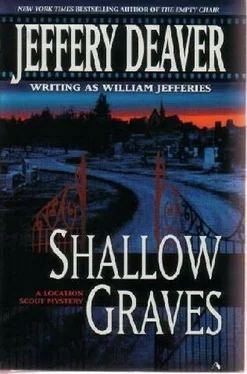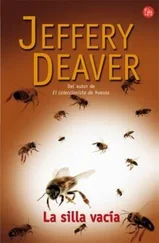No, she was faithful. Though questions of fidelity were the type you ask yourself in a certain way-fast, distracted-so as to avoid the possibility of a real answer. A scientist is not equipped to ask questions like that. Scientists aren't happy until they find the truth and he wasn't sure he wanted the truth.
Keith Torrens drove toward his home. He'd make it up to her. Make up for what?
He wasn't sure.
How?
He didn't know.
Pellam pulled the camper into the driveway.
He saw the beige car parked in the road just past the drive and thought: Oh, hell. No… He recognized the car. Knew who the visitors were.
Thinking about Big Mountain Studio's promise to put mobile phones in all the campers. None of Lefkowitz's minions had ever gotten around to it. And here the nearest house was several miles up the road. No time to get there.
No time for anything.
He doused the lights, parked on the grass, opened the camper door and climbed out.
No one inside seemed to have noticed him.
Everything seemed slowed up, the way they shoot karate fights in those charmingly bad Hong Kong karate flicks, or the way Sam Peckinpah shot his violent scenes. Pellam stepped out of the camper, breathing deeply. He started toward the house, avoiding the gravel.
At least he had surprise on his side.
Man, no question it was fall. That smell of the air's dry coldness, the sweet scent of oak or cherry fires.
Pellam was thinking how seasonless the big cities are. New York, L.A. And it was odd how returning to the country during a blatant time of year-the first deep snow, the week of the most colorful leaves-is more than anything a return to youth. Painful nostalgia, a rearrangement of priorities and possibilities. Blatant seasons.
Pellam figured that was a pretty good observation and he wondered if he'd live long enough to use it in a film.
The sky was almost completely clear now, swept clean by the cold front. He glanced up, seeing the stars in the black vacuum that domed over him from one horizon of trees to another.
A perfect fall night in Cleary, New York. Home of the perfect cemetery.
That's how they'd ended up in Cleary in the first place, looking for the ideal, A-number-one cemetery.
A perfect fall night.
As he moved over the lawn. He saw shadows inside. The flicker of a TV screen. Keith's car was gone. So the twins were in there alone with Meg and Sam.
He hurried toward the house. He slipped the gun in his waistband. There was an open window to the right of the door, opening into a dark room. He could go up a rose trellis and through the window. Come around from behind.
Two of them, both armed, probably.
At least he had surprise on his-
A car pulled into the driveway, catching Pellam in its beams. It gave a long blare on the horn.
From the house, fifty feet away, security lights clicked on, blinding him.
"What's going on?" Keith called from the driveway. He'd parked and gotten out of the car.
Pellam called, "Stay there. Stay back."
He turned back to the house. The front door opened and one of the twins stepped out, holding a pistol at Pellam's chest.
So much, Pellam thought, for surprise.
Pellam supposed that he'd known all along it would come to this.
He walked to the right, out of the glare, onto the driveway, gravel scrunching beneath the worn sole of his Nokonas. He stopped and felt an odd sensation-growing into the drive, like roots going down, solid as the granite slabs the gravel used to be. "Hey, mister. Hey, Mr Torrens."
"What the hell-"
"Quiet," Pellam ordered Keith. The man froze.
This was definitely the ending of a film-not like one of his, though, in which viewers felt all that tension, then nothing happening, the principals moving vaguely off into the credits (boy, he took flak for those endings. Resolve it, John, resolve it. How the world hates the truth of ambiguity).
But here it was. Pretty damn clear to him. A man slouching out onto the porch, holding in his hand an automatic pistol. Meg said she didn't like handguns. They're man-killing guns, she'd have been thinking, no other purpose for them.
The man slouching.
"You interrupted me," the twin said. "Was just about to sit down and watch some TV with a little friend in there."
And where's the other one, Pellam wondered, his brother?
Behind him?
Behind me?
Inside, with Sam?
"Where's Meg?" Pellam asked.
"Whatcha doin' here, mister?"
"Which one're you?"
"Bobby. Hey, don't you move there, Mr Torrens. You do, I'll have to kill you too."
Pellam asked, "You the one who did it?"
"Did what?"
"Killed my friend."
"S'pose you know if I tell you I'll have to make sure that fact doesn't go any further."
"That's pretty much on the agenda anyway, isn't it?" Pellam asked.
"Heh."
"I just want to know if it was you killed Marty."
"Was a hell of a shot, I do say so myself." Not smirking. Just mentioning the fact.
"Whatcha got there?" Bobby asked. "In your belt?"
"It'd be a Colt Peacemaker."
"No kidding. Smokeless powder? Reproduction?"
"Nope. It's the real thing."
"No kidding. Forty-four?"
"Forty-five."
"Heh."
"Where's your brother?"
"Maybe he's behind you."
"So you'll die first," Pellam said.
"Heh."
"Please…" Keith was begging. "Where's my son?"
They both ignored him.
There was no motion. Pellam stood on the wet gravel, his feet, in scuffed black boots, slightly apart.
There was no noise.
There was nothing else in the world except a man standing in front of him with a gun in his hand. A tall Victorian house. With a woman and boy inside, her husband nearby. Under a canopy of a dry, clear fall night.
Pellam had shot ducks and geese and a number of Gila monsters and rattlesnakes and hundreds of Heineken bottles.
He'd never shot a man.
The security lights poured into his eyes, making Bobby a silhouette. (Pellam recalled that, on various target ranges, he'd shot as many silhouette targets as Gila monsters and rattlesnakes combined.)
No face, no motion, no sound.
In the stillness, in this dense peace, a thought came to him. Something he remembered from researching a script about the Indians of the Great Plains. The Sioux, he believed. Waking up on a beautiful day, they wouldn't think how good it was to be alive. What they'd say was, "It's a good day to die."
Good, Pellam. Good thought.
Well, Wild Bill himself hadn't lived to see forty.
Then, finally, motion intruded on the scene. It was a cliché-one that Pellam, if he were directing a Western, wouldn't have allowed the writer to use: He pulled his blue jean jacket open slightly wider to fully expose the grip of his pistol.
The way Bobby saw it (Bobby who had shot a man-several of them, in fact-but only in the backs of their heads after being paid ten thousand dollars each to do it) these were good odds. Pellam had glare in his eyes and he had a single-action gun so he'd have to draw and cock it before he could shoot. It was a six-shot gun and it would take probably three minutes to reload. If he had extra ammo on him. Which he probably didn't.
Also, he figured Pellam hadn't shot anybody in the back of the head or anyplace else for any money.
Bobby, on the other hand, was already holding a cocked Browning automatic.380 with twelve rounds in it. Which all you had to do was aim and pull the trigger. The light was behind him. He could reload the Browning in two seconds.
Torrens was in the yard, true, but he wasn't going to do diddly except stand there like a scared rabbit.
He hoped Billy was watching him. He never missed a chance to impress his smarter brother.
Читать дальше












